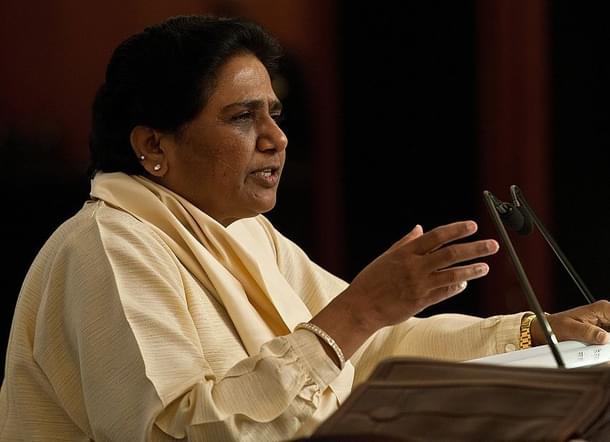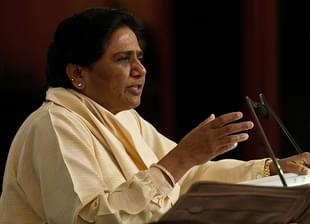Politics
In Numbers: The BSP's Descent Into Irrelevance In Uttar Pradesh
Prateek Rajput
Mar 20, 2022, 01:35 PM | Updated 01:35 PM IST
Save & read from anywhere!
Bookmark stories for easy access on any device or the Swarajya app.


The Bahujan Samaj Party (BSP), with only one seat in the recently concluded assembly elections in Uttar Pradesh, is now facing political oblivion in a state where the BSP supremo Mayawati has been the chief minister on four occasions, as also the longest-serving CM of the state as yet.
Despite the major setback, the BSP chief claimed that the Dalit voters have stood firmly with the party.
"It is a matter of satisfaction that the Dalit voters, especially the ones from my own society (Jatavs), stood like a rock with the party (BSP). I am proud of them and the more I express my gratitude towards them, the less it would be…,” said Mayawati, expressing her heartfelt gratitude to the Dalit voters.
BSP chief Mayawati, with only one seat, may still feel that the Dalits, especially the Jatavs, are standing firm like a rock with her party, but the election numbers do suggest otherwise. The worrisome numbers not only challenge her present claim, but also carry a cautionary message that the way in which a section of the Dalit voters have shifted away from the BSP in these elections, the party is likely to repeat its “zero” of the 2014 parliamentary election in 2024 as well.
What Do The Numbers Suggest?
Defeated in the 2017 assembly elections, the BSP has now slipped from its previous tally of 19 assembly seats in 2017 to just one assembly seat in 2022. This is the lowest ever tally of the BSP since 1991, when the party managed to win just 12 seats.
In these elections, the BSP has not only lost the elections, but in most seats, its candidates have finished as a distant third or fourth. In the 2017 elections, the BSP was runner-up in at least 119 seats, but in these elections, the party candidates have come second in only 18 seats. The BSP, which contested all 403 seats, stood third in 249 seats in the last election, while this time, there are 384 seats where the party has finished either third or fourth.
With every election, the BSP is losing its ground in Uttar Pradesh. This is not only in terms of seats, but also its vote base is getting eroded. The party’s vote share has shrunk from 22.23 per cent in 2017 to just 12.83 per cent in 2022. It appears that the party is now becoming dependent on the Jatav vote bank solely.
Meanwhile, other parties including the BJP appear to have made a dent in the non-Jatav vote bank. In these elections, this breach has become stronger.
While BSP chief Mayawati herself has enumerated various reasons behind the party’s declining strength since 2007, the election results of the three Lok Sabha elections and two Vidhan Sabha elections in the last one-and-a-half decades clearly indicates that now the party’s core Dalit voter base is slipping from its hands.
Deteriorating State In Reserved Seats
Out of the 403 assembly seats in the state, 86 seats are reserved for Scheduled Castes and Scheduled Tribes (SC-STs). The BSP, which had captured 62 reserved seats in the year 2007, could not win even a single such seat this time.
In the last elections (2017), the party got only two reserved seats. The BSP got 17 reserved seats in 2012, 21 seats in 2002, 22 seats in 1996, and 24 seats in 1993. Since its inception, the BSP had time and again waved its blue flag on the basis of the strength it gets from its Dalit voter base, which does not seem to be the case anymore.
It Is Not The Same BSP Anymore
Before the 2007 elections, ‘Behenji’ (Mayawati) was the biggest leader of the Dalits, and the 'elephant' symbol was their first choice. While such a vote share was not enough to put Mayawati into power alone, it has at least won her 98 assembly seats in 2002.
In 2007, Mayawati, with her 'social engineering', managed to form the government by bringing together the Brahmins, the Muslims along with the Dalits, but due to the alleged increasing influence of Brahmins in the party, a section of Dalits and backwards started moving away from the BSP.
In the 2014 parliamentary elections, the BSP scored a zero in Uttar Pradesh and in the country. The party cadre attributed the loss of vote share to the “Modi wave”.
In 2019, Mayawati had formed an alliance with the BSP's 'arch rival', Samajwadi Party (SP), just before the parliamentary elections. While the BSP managed to secure 10 parliamentary seats as part of the “Mahagathbandhan” in 2019, one cannot guarantee that the BSP will repeat a similar performance in the next parliamentary elections due in 2024, where it will most likely fight alone.





